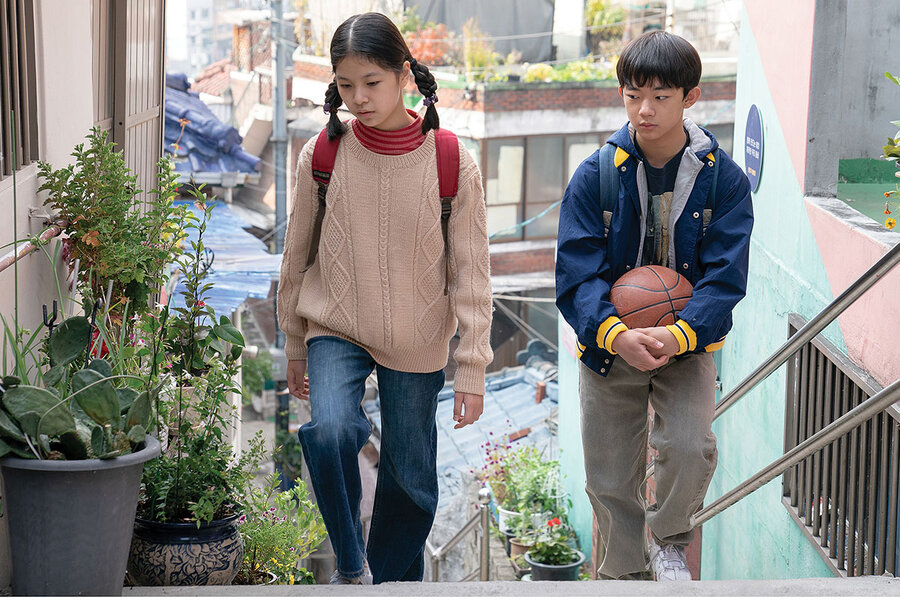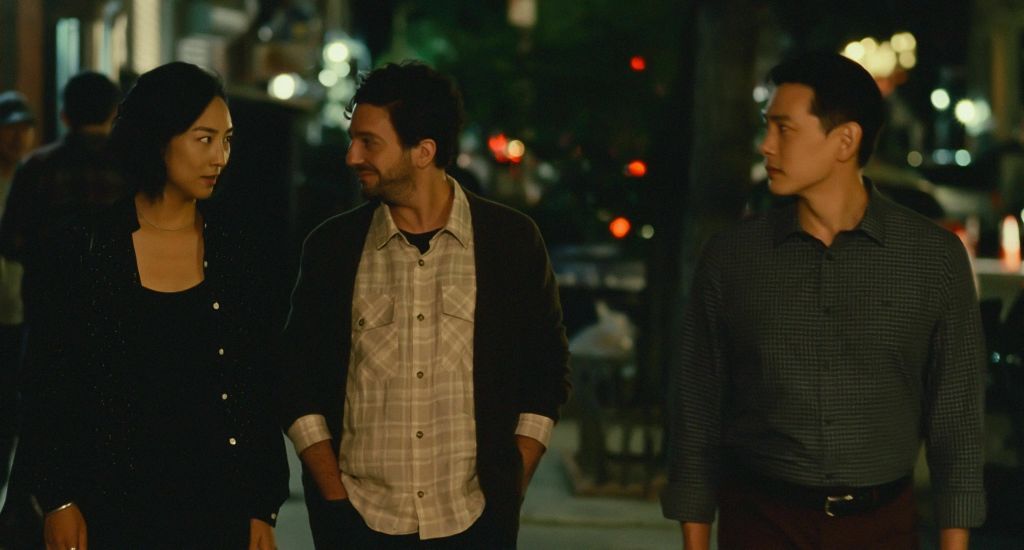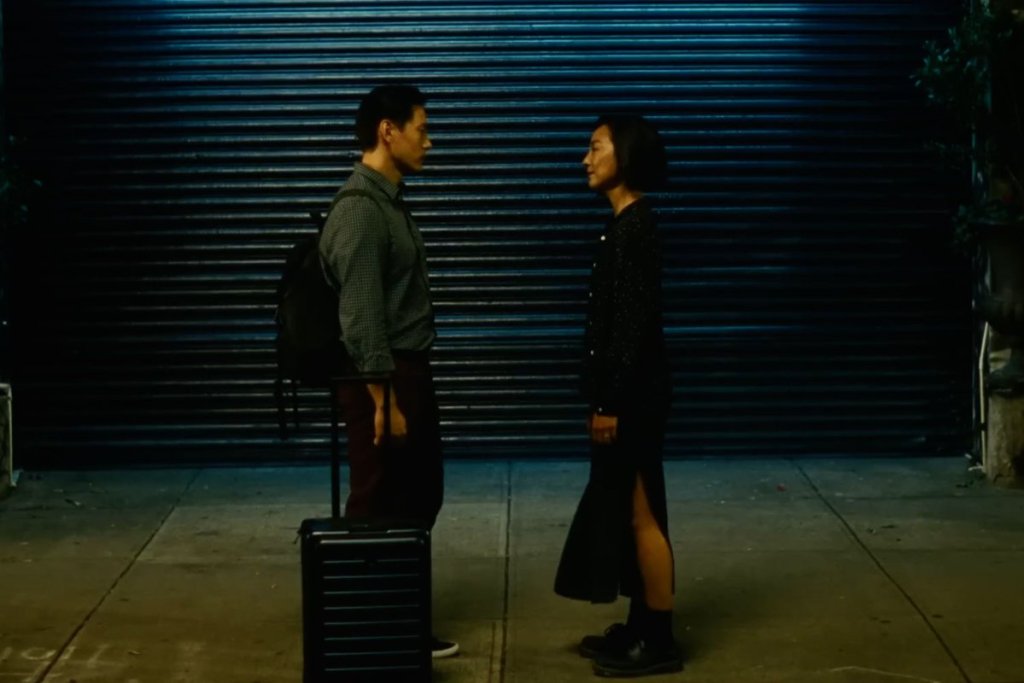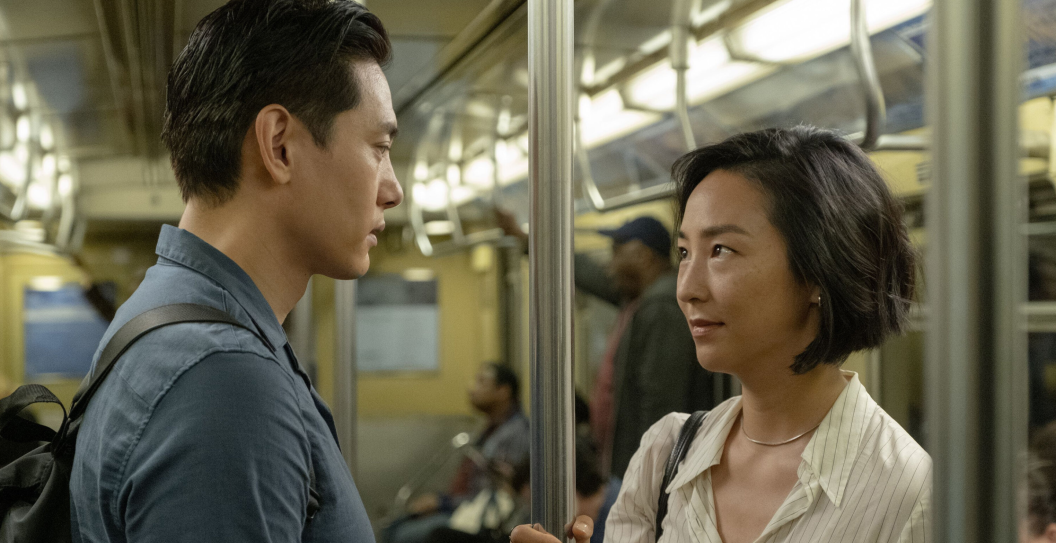The films "Barbie" and "Oppenheimer" have dominated the Oscars buzz in 2024. But there are a variety of exceptional pieces in the running for Best Picture. I'll be reviewing these lesser-hyped nominees in the weeks leading up to the ceremony on March 10. Next on the docket is "Past Lives," which has also been nominated for Best Original Screenplay.
"Past Lives" is a heartbreaking film about a childhood romance between Nora (Greta Lee) and Hae Sung (Teo Yoo), which is torn apart when Nora's family emigrates from South Korea. When the two reconnect as adults, the film asks us whether love is something we choose or something chosen for us. Is true love a thing we will into existence through a complex series of choices and compromises? Or has the universe already determined "the one" for us?
The head versus heart romance debate is nothing new. But "Past Lives" breathes fresh life into the concept. Nora stands at a crossroads between heritage and personal identity, between tradition and ambition. On a broader level, the film is about the dual lives led by American immigrants.
But "Past Lives" also challenges you to find significance and beauty in every life you encounter, from your first childhood crush, with whom you shared walks home from school, to the stranger across the bar, with whom you locked eyes briefly but never met.
Keep going for our full analysis of "Past Lives."
Warning: major spoilers ahead for 'Past Lives.'
In-Yun

A24
"Past Lives" opens from the point of view of two strangers watching our main characters from across the bar. Nora and Hae Sung are lost in conversation. Meanwhile, Nora's husband Arthur (John Magaro) sits idly by, not fully engaged with either of them. The strangers speculate about the threesome's relationship. Are they coworkers? Lovers? Who is together and who is the third wheel? Nora notices the strangers gawking and stares straight at them — at us.
American culture tells us this encounter between strangers is the result of conscious decisions: both parties decided to go for drinks and happened to choose the same bar. But Korean culture suggests something deeper at play.
The core theme of "Past Lives" is characterized by the Korean word "in-yun." While there is no direct translation to English, Nora tells us "in-yun" essentially means "fate," adding that it's "specifically about relationships between people."
"It's an in-yun if two strangers even walk by each other on the street and their clothes accidentally brush," she says. "Because it means there must have been something between them in their past lives."
Further, "If two people get married, they say it's because there have been 8,000 layers of in-yun over 8,000 lifetimes."
Nora's direct eye contact with us, the viewer, suggests she is more than a stranger. You knew her in a past life. Maybe you loved her in a past life. Or maybe you will love her in a future life. Something more than our own decisions put these strangers here before us. We can extrapolate this to mean that every stranger we encounter during the day has a connection to our past lives.
In this way, the film challenges the Western viewer to see the world through a Korean lens — to consider that love and fate and even whom we sit next to on the subway are bigger than the present.
Korean Versus American Culture

A24
Nora is an embodiment of conflicting Korean and American cultures. And there's a key symbol used to show the difference between the two: tears.
The first act of the film shows Nora, still named Na Young, growing up in South Korea. She has lofty dreams of becoming a successful writer. She's also a highly emotional young girl who cries often. Hae Sung always comforts her when she cries and eventually, a romance between them blossoms. But as soon as it does, Na Young's parents tell her they are moving to Canada. Hae Sung is devastated. But Na Young is excited about the possibilities a Western life holds. "Koreans don't win the Nobel Prize for literature," she says.
The childhood romance between Na Young and Hae Sung ends at a literal fork in the road, with each of them returning to their respective homes. But it's also a cultural split — one that sees Na Young embracing a Western culture different from the one in South Korea.
The film jumps ahead 12 years. Na Young now calls herself Nora and lives in New York City, where she pursues a career as a playwright. Hae Sung is still in South Korea. We join him at dinner, where he's crying over a recent breakup and his friends comfort him. He reaches out to Nora on Facebook and the two hit it off, beginning a long-distance relationship. Gentle piano music sweeps us from one sweet moment to the next. Nora stays up all night talking to Hae Sung, falling asleep in the glow of her laptop. She tells him that she still has dreams of becoming an award-winning writer. And she tells him that she doesn't cry anymore — unlike South Korea, in America, no one cared when she became emotional. She learned to suck it up.
Much like the concept of "in-yun," crying represents the romantic and traditional culture of South Korea. This contrasts with the American culture Nora adopts, which is fueled by ambition. Both Nora and Hae Sung weep openly in South Korea, receiving comfort in return. In America, Nora stifles this outward display of emotion.
Eventually, the montage of long-distance bliss is accompanied by a sorrowful cello. Nora and Hae Sung soon realize they are too busy to visit each other. And Nora is too focused on her career to be distracted by a relationship so infeasible. As the connection on their Skype call fizzles out, so too do their hopes of being together.
Her career-driven life in America sees her meeting a man at a writer's retreat, Arthur. Fast forward another 12 years and we see that Nora and Arthur are married. Their relationship sounds ideal on paper. He's a writer like Nora. They can split the steep New York City rent. And their marriage granted Nora a green card.
We learn the two are married as a customs agent questions them. This clinical, aromantic reveal suggests that Nora followed her head, not her heart. Arthur is the smart choice — the logical choice that fits conveniently with her goals.
So when Hae Sung contacts her yet again, after 12 long years, she can't just throw it all away to be with him in South Korea. She can't give up her husband, her writing dreams and her life in America because of this romantic, traditional idea of "in-yun"... can she?
'Past Lives' Ending Explained

A24
Nora and Hae Sung meet in New York City, their first face-to-face encounter since childhood. They spend the week together, and these scenes are filled with a will-they-won't-they tension. Lee does a fantastic job showing Nora's inner turmoil — the longing and confusion on her face are palpable.
As Arthur and Nora lie in bed together, Arthur says that he's the villain in their story — the "evil white husband" who prevents two Koreans destined for love from being together. Nora assures him this isn't the case. However, we can't help but think he may be right. Nora also reveals that she used to be a crybaby as a kid, which Arthur didn't know.
The three of them meet up and we return to that scene at the bar — now with the appropriate context. Nora and Hae Sung talk, and Nora translates the conversation for Arthur. But Nora and Hae Sung soon escape into their own world, seemingly forgetting that Arthur is even there. Speaking in Korean, Hae Sung waxes poetic about a life that could have been with Nora — a life in which they married and had children. Part of me wished for this to be so. But my heart also broke for Arthur as I watched him being emotionally cuckolded. When Nora excuses herself to the bathroom, Hae Sung apologizes for excluding him from the conversation, but Arthur gets it. He sympathizes with Nora, who's grappling with her dual lives. He gets her. And really, what more could she ask for? So when Hae Sung concedes that in-yun led Nora to Arthur, that it was actually Arthur who shared the 8,000 in-yuns in 8,000 past lives with her, we're inclined to agree.
I found myself wishing for Nora to somehow be with both of these men. I wish that her unlived Korean self could spring into reality and live with Hae Sung. And maybe — as the final scene suggests — it could.
Nora joins Hae Sung as he waits for his Uber. The two share desperate glances full of yearning and we wonder if one of them will lean in for the kiss. The moment is peppered with quick shots of them together as children. Sadly (or thankfully? I'm just so conflicted here), Hae Sung climbs into the cab without a smooch, but before he does, he wonders whether they'll be together in a future life. Nora says, "I'll see you then," before she walks back to Arthur, where she embraces him and bursts into tears. The moment mirrors Hae Sung comforting Nora as a child.
Those final quick shots of Nora and Hae Sung as children — her bursting into tears in Athur's arms — reconcile her two selves. She chose Arthur and a life in America. A life of ambition and stifled emotion. A life where the pursuit of personal achievement takes precedence over her Korean heritage. But Na Young, that little Korean girl who cried all the time, is still within her.
The Korean concept of in-yun says that past lives shape who we become. The film leaves it up to us to believe in in-yun or not. However, during our present lifetimes, the stretch from birth to death we know exists, we also experience multiple lives (who is Na Young if not Nora's past life?). And these, the film argues, are inextricably linked to us. Whichever path we choose, the unchosen path doesn't merely vanish. Rather, the two paths unfurl ever forward, periodically and unavoidably intersecting with each other. And when they do, we are reminded not only of who we could have become — but who we are.
"Past Lives" is currently streaming on Paramount + and Showtime.




